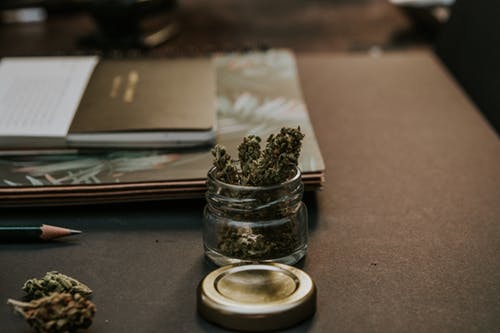
Posted: Jan 10, 2019

DENVER – Sprinkled on doughnuts, mixed into milkshakes or infused into olive oil, make no mistake: Cannabis is coming to a kitchen near you.
Chefs across the country say cannabis-infused food and drinks are the top two dining trends they expect to see unfold in 2019, although we’re not talking about food that will get you “high" – these are products made with CBD, a non-psychoactive compound extracted from cannabis plants that enthusiasts say offers health benefits while tempting the palate.
"I'm telling you, 75 percent of my clientele is doctors, nurses and lawyers," said Josh Schwab, 45, whose Denver-area doughnut shop, Glazed & Confuzed, makes a CBD-frosted doughnut topped with a candied hemp leaf and sells more than 30 each weekend day. "You get all the relaxation without the head high. It kinda just takes the edge off."
"I was tired of living every day anxious. I wanted to be more present and calm. That’s what CBD does for me," said Eppers, whose fledgling company sold more than 1.1 million bottles last year.
The survey of chefs was part of an annual poll for the National Restaurant Association, which checked with more than 650 professional chefs. Of those, 77 percent said CBD drinks are the No. 1 trend they see for 2019, followed by CBD foods.
Zero-waste kitchens were the third top trend identified by the chefs, who are all members of the American Culinary Federation and who previously singled out artisanal cheese, house-made condiments and savory desserts.
Heads-up: These same chefs say pretzels in desserts are on their way out.
Hudson Riehle, 65, the restaurant association's senior research director, said it's too early to tell whether CBD is just a fad that will fade into history like molecular gastronomy or meals served in mason jars. U.S. restaurants are an $850-billion-a-year industry that employs about 15 million people, and the daily conversations chefs have with customers help inform the survey, Riehle said.
"Ultimately, what the consumer wants comes to fruition," he said.
Because CBD products are often derived from hemp, which is usually imported but is legal nationally, diners can expect to see CBD on menus across the USA, although specific regulations vary.
Although there's relatively little peer-reviewed research available on CBD's health benefits, its fans say it can help treat insomnia, anxiety, pain and seizures. Others say it provides mild relaxation without intoxication. (Marijuana-infused foods are a different story.)
At Colorado's The Cereal Box, where customers can add a taste-free $3 scoop of CBD powder to their cereal, coffee or milkshake, co-owner Lori Hofer said she spends a lot of time explaining the difference between CBD and THC, the marijuana compound that gets you high.
She said Colorado customers tend to know more about CBD because the state has been at the forefront of marijuana legalization for so many years.
"We have to tell them 'This is not something you're going to get high from,'" said Hofer, 40. "But you get a moms group in here with a bunch of kids and she might want some CBD."
The Food and Drug Administration says anyone making specific health claims about hemp-derived CBD products must first submit them for review, and it says marijuana-derived CBD products remain illegal at the federal level, no matter whether they're legal in states. CBD is short for cannabinoidol, one of the many compounds in both hemp and marijuana plants, which are collectively known as cannabis.
Federal uncertainty aside, customers can buy CBD products such as JuJu Royal's $50 infused olive oil, Stillwater's Clockwork Coffee and Coalition Brewing's Two Flowers IPA.
Marijuana research firm Greenwave Advisors predicted the CBD industry could reach $3 billion by 2021 and eventually more than $200 billion a year in the USA. A farm bill that legalized U.S.-grown hemp could fuel CBD industry growth in the coming years.
At Otium in Los Angeles, bartender Chris Amirault makes several drinks with CBD, including the Pineapple Express, which is based on a Negroni, and the Blue Dream, a spiked Mai Tai. Though many CBD products are made with odorless, tasteless powder, Amirault, 30, uses CBD oil, which he says gives an unmistakably "herbaceous" taste: "Guests are all about it. They’re extremely curious."
Longtime CBD evangelist Joel Stanley, 39, said he has watched for years as CBD slowly gained recognition, first for treating seizures in children, then more broadly for aches and pains, relaxation and anxiety. Some pet owners champion CBD products for aging animals struggling with joint pain.
"We're just at the tip of the iceberg of what CBD and cannabinoids can offer," said Stanley, chairman and co-founder of Colorado-based Charlotte's Web, which was featured in a 2013 CNN documentary for its work with a young girl suffering from severe seizures. "We're going to find out what all these tools can do after being prohibited for so many years."
By Trevor Hughes
January 10, 2019
Source: USATODAY.COM
Go-Wine's mission is to organize food and beverage information and make it universally accessible and beneficial. These are the benefits of sharing your article in Go-Wine.com


The Wine Thief Bistro & Specialty Wines is a locally owned small business in downtown Frankfort, IL offering world class wines in a relaxed, casual gathering spot for friends and family. Offering world class virtual tastings and touchless carryout.
https://www.twtwineclub.com/aboutus
Go-Wine 25 Great Wineries in US selection prioritizes quality, value and availability.
www.go-wine.com/great-wineries-in-america
Tasting wine is a nice experience, but visiting the places in which wine is made is a magic moment. Available in New York City for touchless pickup.